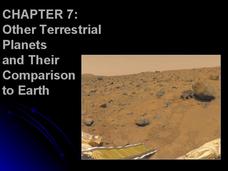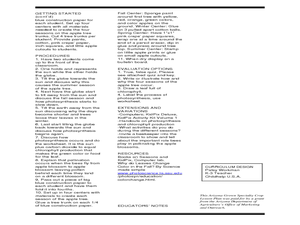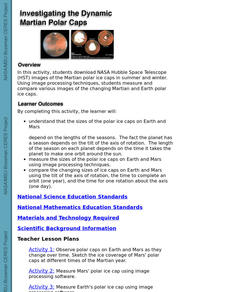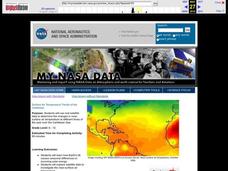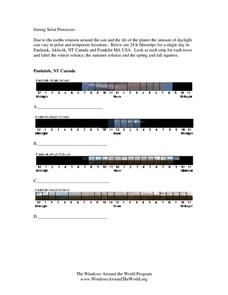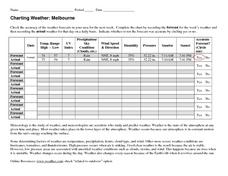Glynn County School System
Terrestrial Planets
Mercury, Venus, Earth, and Mars are collectively known as the terrestrial planets. Although part of the same group, each planet has its own set of characteristics. Scholars explore the characteristics that make the planets unique and...
Curated OER
Apple: Bare to Pick
Students investigate the seasons of the apple tree. In tree seasons lesson, students use a sun model and a globe to study the tilt of the Earth to create the seasons. Students discuss the tilt and the seasons. Students discuss...
Curated OER
Celebrating the Solstice and Equinox
Fourth graders graph the number of daylight hors throughout the year and examine why day length varies. They discover that seasonal changes and latitude on Earth affect the number of hours of daylight in each day. Students listen to...
Curated OER
Investigating the Dynamic Martian Polar Caps
Learners download NASA Hubble Space Telescope images of the Martian polar ice caps in summer and winter, and measure and compare various images of the changing Martian and Earth polar ice caps.
Curated OER
Surface Air Temperature Trends of the Caribbean
Students investigate the seasonal changes to sea surface and near-surface air temperatures near the equator. They use actual satellite data to track and graph the differences in air and sea temperatures during different seasons in the...
Curated OER
Seasons of the Year
Students examine how the link between the tilt of the Earth's axis to the ecliptic and seasons of the year--length of day, effectiveness of sunlight, polar day and night, and seasons south and north of the equator, as well as near it.
Curated OER
Seasons' Journey: As the World Turns
Fourth graders explore the earth's revolution around the sun and the changes in weather that follow this motion.
Curated OER
How the Amount of Solar Energy Absorbed by the Earth is Dependent Upon the Earth's Position
Students investigate the angle of light and how it faces the earth. They conduct a series of investigations with the following two objectives. Students determine if the angle of light is a factor in the absorption of heat. They correlate...
Curated OER
A Map as a Tool
Students study the concept of using a map as a tool with the usage of a balloon designed to mimic the features of the Earth with the major features marked and shown on the balloon.
Curated OER
Cloudy vs. Clear
Students analyze line plots. In this weather lesson using real NASA data, students discuss how weather affects the way the Earth is heated by comparing different line plots.
Curated OER
Learning Lesson: The Shadow Knows I
Students examine the elevation of the sun to discover the changes in seasons. They observe and measure the length of their shadow. They compare this measurement to one taken four months later.
Curated OER
The Winter Solstice
In this winter solstice instructional activity, students read a detailed text about the winter solstice and the historical and religious significance of this day. Students then complete a 15 question fill-in-the-blank and true/false...
California Academy of Science
Tropical Belt
Where in the world is the equator? Explore a world map with your class, coloring in oceans, continents, and rainforests while locating the three major lines of latitude: the equator, Tropic of Cancer, and Tropic of Capricorn. Discuss how...
Curated OER
Space Science: Constellations and the Sun
Students review the zodiac signs and illustrate their movement using constellations on the wall and themselves to represent earth. Individually or in groups, they stand in the center of the room while a shadeless lamp is placed between...
Curated OER
Mississippi’s Contribution to Space Exploration
Eighth graders engage in a class discussion while going through a PowerPoint on Mississippi's contribution to space exploration. In this Space science lesson plan, the students will also participate in Brain Pop quizzes where they will...
Curated OER
Science Trail
Students explore the solar system by conducting Earth science experiments. In this Sun lesson plan, students identify the different seasons on Earth and discuss their purpose and cause. Students create a sundial and observe the changes...
Curated OER
Weather "Why"
Students research weather and explore how to use their research information. In this weather information lesson plan, students visit a given website for weather forecasts. Students graph the weather, sing weather songs and select a class...
Curated OER
Our Solar System
Students analyze the theories of the formation of the universe and solar system. Students analyze planetary motion and the physical laws that explain that motion: Rotation, Revolution, Apparent diurnal motions of the stars, sun, and...
Curated OER
Seeing Solar Processes
In this seasons activity, students compare 24 hour filmstrips for a single day in Canada, the U.S.A., and the Arctic Circle to determine the different seasons. This activity has 12 fill in the blank.
Curated OER
Charting Weather: Melbourne
In this earth science worksheet, students check the accuracy of the weather forecasts in their area for a week. Then they complete the chart by recording the forecast for the week's weather and then recording the actual weather for that...
Curated OER
Mars Calendar Project
Learners design a calendar that displays time on Mars. They explore the differences between time on Earth and time on Mars while making the calendar.
Curated OER
Tracking Sunrise and Sunset
Pupils collect, record, and graph the sunrise and sunset times. They explain how the relationship between the tilt of Earth's axis and its yearly orbit around the sun produces the seasons.
Curated OER
Water and Ice: Part 1
Students observe the state changes in water. In this matter lesson, students observe, measure, and describe water as it changes state. Students explore how water can change from a solid to a liquid then back again. They journal their...
Curated OER
Mars
After reading a short excerpt about the planet named after the Roman god of war, Mars, your class will answer four comprehension questions. The activity challenges them to fold over the paper and answer the questions without referring...


